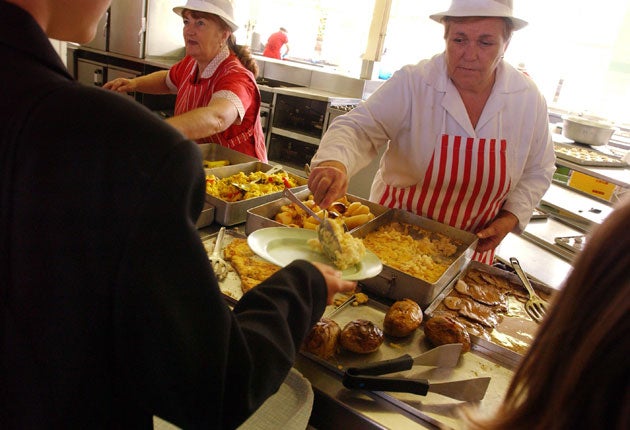Heads target free school meals as route to extra funds
Low-income parents encouraged to sign up their children to trigger pupil premium payments

Your support helps us to tell the story
From reproductive rights to climate change to Big Tech, The Independent is on the ground when the story is developing. Whether it's investigating the financials of Elon Musk's pro-Trump PAC or producing our latest documentary, 'The A Word', which shines a light on the American women fighting for reproductive rights, we know how important it is to parse out the facts from the messaging.
At such a critical moment in US history, we need reporters on the ground. Your donation allows us to keep sending journalists to speak to both sides of the story.
The Independent is trusted by Americans across the entire political spectrum. And unlike many other quality news outlets, we choose not to lock Americans out of our reporting and analysis with paywalls. We believe quality journalism should be available to everyone, paid for by those who can afford it.
Your support makes all the difference.Hundreds of schools have driven up the amount they will be paid under the Government's "pupil premium" initiative – designed to "reward" them for taking poorer children – by encouraging parents to apply for free school meals (FSM) for their children, even if they don't eat them.
Amid growing concerns over pressures on school budgets, headteachers and local councils have targeted the premium, allocated to those pupils eligible for FSM, as a key source of extra income. Teachers estimate the device is worth at least an extra £10m.
They have co-ordinated a widespread campaign to persuade all low-income families eligible for FSM to register, qualifying their schools for an extra £430 per child.
But health campaigners complain that registering for FSM simply as a way to get more money undermines the message that free meals are a vital element of a child's education.
The School Food Trust chairman, Rob Rees, said: "Extra efforts by schools to encourage families to sign up for their free school meals are always welcome, but it's vital to remember that this isn't just about securing additional funding. The most important thing about a free school meal is that it guarantees a child a tasty, nutritious lunch every day."
Tim Nichols, of the Child Poverty Action Group, said: "I think it is inevitable that this would happen, given the financial incentive that has been created by the decision to link the pupil premium to FSM qualification."
The pupil premium was a central policy in the coalition's programme for government, which promised "a significant premium for disadvantaged pupils from outside the schools budget by reductions in spending elsewhere". The extra cash will be available for assistance, including reducing class sizes or on more personal tuition for deprived pupils, although ministers said schools would be able to decide how to spend the money.
The spending watchdog, the Institute for Fiscal Studies (IFS), predicted a rush to sign up eligible pupils for FSM in time for the annual school "census".
The IoS has established that hundreds of schools – many in the wealthiest parts of the country – immediately sought to encourage parents to overcome the "stigma" associated with free meals.
In a letter to parents earlier this year, Longcroft School in East Yorkshire claimed that eligible children who had not signed up for FSM could be worth £3.5m to local schools.
The headteacher, Lesley Hughes, added: "If you register, your child would be eligible for a free meal but would not have to take it if they didn't want to do so. However, the school would receive the pupil premium."
A briefing to council leaders in Sutton, an affluent London borough, said: "Some schools have indicated that parents and pupils are often reluctant to register for a free school meal.
"However, the introduction of the pupil premium does give you the opportunity of encouraging families to register as this will result in additional funding being allocated to schools."
The Association of Teachers and Lecturers (ATL) claims the proportion of children registered as eligible for FSM has risen from 17.4 to 20 per cent since January 2010. The ATL deputy general secretary, Martin Johnson, said: "With the recession, there are more families struggling financially, so there will be an increase in the number of children eligible for FSM. However, many families will probably still be reluctant to admit their children are eligible for FSM because they see it as a stigma."
A spokesman for the Department for Education said last night: "Obviously schools are going to want to maximise the amount of money they get, and if that means more people who are eligible for FSM registering, them we are pleased with that. But it would be disappointing if schools did not think it was helpful for their children to have a healthy meal."
Join our commenting forum
Join thought-provoking conversations, follow other Independent readers and see their replies
Comments